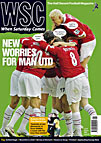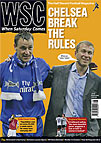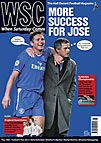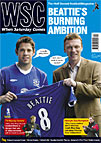 Out of Division One at 27, dead at 59: Joyce Woolridge considers the gifts and faults of a man who crammed so much into a career and a life that both ended too soon
Out of Division One at 27, dead at 59: Joyce Woolridge considers the gifts and faults of a man who crammed so much into a career and a life that both ended too soon
British football first discovered sex in September 1963, when a shy young Irishman made his debut for the most glamorous team in England. Before long the chant of “Georgie, Georgie” deafened visitors to Old Trafford, from male and female fans drawn by the brilliant impudence of his play and darkly handsome Celtic allure.
When George Best first began to dazzle on Manchester United’s left wing, contemporaries cast around for the former player he most resembled, and dubbed him the “new Stanley Matthews”. But the comparison was soon discarded as it became clear that the young Irishman was not only a skilful and lithe wizard of the dribble, but also, unlike the eccentric Potteries puritan, a prolific marksman with a physical vibrancy and style of his own. Best in his turn has become the standard against which today’s potential superstars are measured. Arguably the greatest British player ever; no one has yet come close to matching his many gifts.
Best’s mentor, Matt Busby, considered him blessed with more individual ability than any player he had ever seen. Strong and courageous, despite his slight build, controlling the ball effortlessly with both feet, he left defenders floundering in his wake all over the world. An accomplished header of the ball with a powerful shot, he scored his goals from all areas of the pitch, often with a touch of impertinence, which his supreme confidence in his own powers gave him. A favourite trick was to play the ball against the legs of opponents to take the rebound like a one-two pass.
Many reckon his greatest game to be United’s European Cup quarter-final of March 1966 against a Benfica team of 11 internationals. George famously apologised to his manager at half-time, after scoring two scintillating goals, one with a spring-heeled header after only six minutes, the other from a long solo run, running round three defenders to slide the ball into the corner of the net (a third was controversially disallowed for offside). United had been instructed by Busby to “keep it tight for 20 minutes”.
Rarely injured, despite the best efforts of cloggers under instructions to put him out of the game, he was one of the mainstays of the United team that won the First Division in 1965 and 1967 and the European Cup in 1968, the year in which Best was voted European Footballer of the Year.
Best was to meet his toughest challenges off the pitch. He made no secret of his enjoyment of Manchester’s burgeoning club scene and the charms of the legions of women who pursued him relentlessly. He opened his own boutiques, modelled for catalogues and endorsed an array of products from sausages and eggs to aftershave. Though only a moderate drinker at first, he became addicted as United’s fortunes dipped under Busby’s successors and the media and public attention grew ever more oppressive. United desperately needed a fit Best (he continued to be the club’s top scorer), but his indiscipline and frequent disappearances led to his first “retirement” in 1972. After a brief return under Tommy Docherty, coaxed back by Sir Matt, Best’s first-class football career was finished by the age of 27, though he turned out for clubs from Dunstable Town to Cork Celtic and played for several seasons in the United States until 1981, where he married and his son Calum was born.
The 1980s was Best’s “lost weekend” of a decade. He even spent Christmas Day 1984 in jail for drunken driving and Kevin Keegan was voted the better footballer by a television panel. He began the Nineties with a cringingly embarrassing but mercifully brief inebriated appearance on the Wogan show, but he was already re-emerging into public favour as an intelligent and witty after-dinner speaker and television pundit. Best always had something of the phoenix about him: grizzled and bloated one moment, he would reappear slim and handsome again as he temporarily seemed to have conquered his demon. But the liver transplant that offered hope of a new start sadly also gave him the opportunity to resume drinking.
Much energy has been expended in trying to compare Best with modern players, for the benefit of those too young to have actually seen him play. The suggestions have all been wide of the mark. Best was not athletic like Thierry Henry; he ran with a “dribblers’ shuffle” that has disappeared from football. Neither was he a powerhouse like Wayne Rooney. I remember Best seeming to float across the churned-up cowfields that served as pitches in the 1960s; Geoffrey Green’s description of Best as a “dark ghost” drifting along the wing has never been bettered. A famous clip shows him playing without his boot, which had been torn off by a sliding tackle. He did this on more than one occasion. If memory serves he once beat a man and took a shot at goal with a stockinged foot.
He was utterly determined not to be kicked out of a game. In a match against Huddersfield Trevor Cherry followed him around, bringing him down at very opportunity, but Best just picked himself up and went back for more again and again. If the “hard man” was of a sufficiently high status (Cherry didn’t count), then George would (in the absence of any protection from the referee) deign to make a fool of him by standing over the ball, beckoning him into making a crude lunge so he ended up on his backside as Best dropped his shoulder and went on his way. He did this several times to Arsenal’s Peter Storey in the course of one game when lesser men would have desisted out of concern for their personal safety and future careers.
When Bob Bishop telegrammed United to recommend the five-foot, eight stone, 15-year-old Best, he claimed: “I think I have found a genius.” Very few would disagree that, with Best’s death, football has lost one.
From WSC 227 January 2006. What was happening this month
 Manchester Utd equal highest ever winning points margin. By Neil Rose
Manchester Utd equal highest ever winning points margin. By Neil Rose

